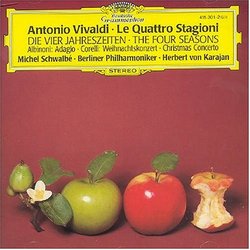| All Artists: Antonio Vivaldi, Tomaso Albinoni, Arcangelo Corelli, Herbert von Karajan, Berlin Philharmonic Orchestra, Horst Gobel, Wardemar Doling, Wolfgang Meyer, Wolfgang Sebastian Meyer Title: Vivaldi: The Four Seasons/Albinoni: Adagio in G/Corelli: Concerto Grosso in G Members Wishing: 0 Total Copies: 0 Label: Dg Imports Release Date: 4/8/1985 Album Type: Import Genre: Classical Styles: Chamber Music, Forms & Genres, Concertos, Historical Periods, Baroque (c.1600-1750), Classical (c.1770-1830), Modern, 20th, & 21st Century, Instruments, Strings Number of Discs: 1 SwapaCD Credits: 1 UPC: 028941530127 |
Search - Antonio Vivaldi, Tomaso Albinoni, Arcangelo Corelli :: Vivaldi: The Four Seasons/Albinoni: Adagio in G/Corelli: Concerto Grosso in G
 | Antonio Vivaldi, Tomaso Albinoni, Arcangelo Corelli Vivaldi: The Four Seasons/Albinoni: Adagio in G/Corelli: Concerto Grosso in G Genre: Classical
|
Larger Image |
CD DetailsSimilar CDs |
CD ReviewsA Great German Romantic Interpretation of a Baroque Italian Octavius | United States | 10/10/2005 (5 out of 5 stars) "Karajan is probably one of the most accomplished conductors to come out of post-Mahler era of German symphonic tradition influenced strongly by Beethoven, Mahler, and Wagner. This means that in addition to usually using larger groups to play the smaller traditional chamber group pieces as intended here, the instruments with symphonies such as the Berlin Philharmonic are also generally modern except perhaps for the soloist's. Conductors and musicians are trained to perform every piece as if it were a Mahler symphony. All of these things redefine the piece significantly so the performance simply has more the dynamics of a German Mahler or Wagner piece instead of an Italian chamber piece which was devised for different and smaller specifications as well as style of performance. This performance is almost a full adaptation or transcription instead of an interpretation and so grandiose in scope that it's even too much for Beehthoven's symphonies. Solti has a similar style although Karajan I find to be better as he is often less hesitant with Vivaldi and is more passionate in his interpretations. This is a good performance to look into if you like modern symphonic interpretations for traditional chamber pieces. Violin virtuoso performances such as Perlman's are also in this category. There are few to boast of that are played in the Baroque tradition as there are few groups out there who can really play Vivaldi well in that style: especially this piece. The best in my opinion would be Pina Carmirelli's 1982 performance with I Musici di Roma. In addition to the group playing on Stradivari, Carmirelli has a very fluid and constant interpretation that is Romantic but mostly traditional. A close one behind that is Salvatore Acardo's Stradivarius performance with I Solisti delle Settimane Musicali di Napoli (Acardo actually performed this piece with I Musici as well.) Karajan's however is probably one of the best ones to come out of the German orchestral tradition of interpretation such as with Solti, Toscanini, and even Bernstein who all rose from that discipline from the early 1900s to the '50s and 60's. All of them are accomplished legends in symphonic direction and good investments if you like this style of interpretation."
|

 Track Listings (18) - Disc #1
Track Listings (18) - Disc #1


